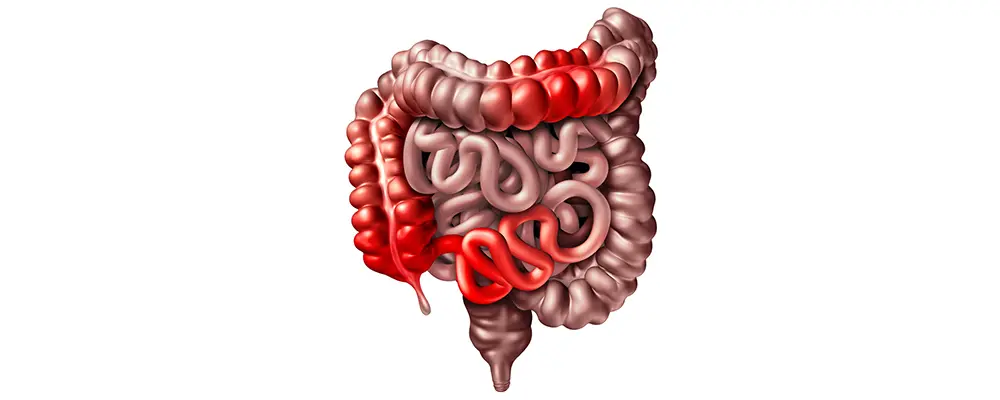Last Updated on January 19, 2023
Introduction
Living with Crohn’s disease can be challenging. Your routine life is turned upside down with frequent restroom visits and stomach aches. The condition takes a toll on mental well-being with bouts of frustration and despair. Crohn’s disease is a typical digestive condition. It is an inflammatory bowel disease affecting the ileum and colon. Approximately more than half a million Americans suffer from Crohn’s disease. Women are more inclined than men to have it. Let’s talk about Crohn’s disease life expectancy.
This blog will cover a variety of topics, including Crohn’s disease symptoms and treatments, risk factors, the connection between ulcerative colitis and Crohn’s disease, pregnancy, Crohn’s disease life expectancy, and much more.
What is Inflammatory Bowel Disease?
Inflammatory bowel disease or IBD is an inflammatory ailment that affects the digestive tract. It is an umbrella term for two conditions, i.e, Crohn’s disease and Ulcerative Colitis. The symptoms of IBD vary counting on the severity and location of the lesion. The symptoms range from diarrhea, and bloody stool to weight loss. A persistent shift in bowel movements might indicate the need to see a physician.
Causes of Crohn’s Disease:
There is no recognized etiology for Crohn’s disease. It is assumed that several factors, such as:
- Family History – if a close relative has it, you’re more likely to have it,
- An immune system disorder that induces the body’s defense system against infection to attack the digestive system,
- Smoking,
- An earlier stomach bug, and
- An unbalanced mix of gut bacteria.
Symptoms to Look Out For:
Any component of your small or large intestine may be impacted by Crohn’s disease, and it may be persistent or comprise several segments. Some patients only have the disease in their colon, which is a passage of their big intestine.
The severity of Crohn’s disease symptoms can vary from minor to severe. It can also impact Crohn’s disease life expectancy. Though they frequently come on gradually, they can also do so quickly and without warning. Additionally, there may be times when you experience no symptoms or indicators (remission).
Some of the symptoms include:
- Diarrhea,
- Fever,
- Fatigue,
- Abdominal pain and cramping,
- Blood in your stool,
- Mouth sores,
- Diminished appetite,
- Weight loss, and
- Discomfort or drainage near or around the anus due to inflammation from a tunnel into the skin (fistula).
Additionally, those with severe Crohn’s disease might experience:
- Inflammation of the eyes, joints, and skin,
- Inflammation of the bile ducts or liver,
- Renal stones,
- A deficit in iron (anemia), and
- Delayed sexual development or growth in kids.
What are the Complications of Untreated Crohn’s Disease?
Despite having complications from the condition, the risk of them becoming life-threatening are infrequent. However, serious complications are a possibility and they do happen. These complications can impact Crohn’s disease life expectancy.
Crohn’s disease complications include:
- Malnutrition: Your body may not be able to absorb nutrients and vitamins from the food you eat if your digestive tract is inflamed. Children who have pediatric Crohn’s disease are more likely to develop health problems from this consequence.
- Fistulas in the digestive tract: Fistulas occur when abnormal holes in your bowels are brought on by digestive system inflammation. These fistulas can cause gastric fluid to pass through your intestines’ lining. They may potentially get an infection.
- Abscesses: An abdominal abscess is an infected pocket that has swelled up. Inflammation from IBD can penetrate the intestines’ walls and cause uncomfortable abdominal abscesses.
- Ulcers: Open wounds on your body, such as stomach ulcers, can spread infection. Ulcers can occasionally result from Crohn’s disease inflammation.
- Obstruction in the intestines: Untreated Crohn’s disease can eventually thicken the lining of your intestines, obstructing your bowels. Stool passage may become challenging or impossible as a result. Intestinal obstruction may, in extreme situations, result in a medical emergency and necessitate surgery.
Crohn’s in Children:
Anyone can develop Crohn’s disease at any age. Ages 15 to 35 are the most commonly affected groups. But young children can potentially get Crohn’s disease. The symptoms of Crohn’s disease are more or less the same as adults, including abdominal pain, fever, weight loss, rectal bleeding, etc. Crohn’s disease life expectancy is higher if management and treatment are carried out at the right time.
Crohn’s disease may be more prevalent in kids or teenagers who:
- Have a history of Crohn’s disease. This could be a close relative; typically a father, sister, or brother,
- Live in cities, developed nations, and northern climates, and
- Smoke
How Does Crohn’s Relate to Blood Disorders?

You’re probably familiar with the exhaustion that frequently goes along with having Crohn’s disease if you have it. Crohn’s disease can directly cause fatigue. Iron deficiency anemia is another factor that could be contributing to your lack of energy.
While there are many possible reasons why you can have low iron levels in your body, bleeding in the digestive tract is most frequently the culprit in individuals with Crohn’s disease. Most of the time, people are unaware that they are losing blood when this occurs. This is due to the fact that blood loss can occur gradually and for a long time without obvious signs. This can significantly impact Crohn’s disease life expectancy; it may reduce it.
Crohn’s and Diet: The Do’s and Don’ts:
When you have inflammatory bowel disease (IBD) and are experiencing a flare, it’s crucial to stay away from foods that could bring on new symptoms and opt instead for nourishing and healing foods. Introducing new foods and adding water, broth, tomato juice, and rehydration products help to maintain hydration. Before changing your diet, speak with your physician or dietician.
Only two to three pieces of red meat each week are necessary to get enough iron from it. While particular meats typically rank among the top sources of iron in terms of the nutrient’s absorption and bioavailability, additional food sources of iron include:
- Dark-green vegetables with leaves,
- Stale fruit,
- Legumes such as beans, and
- Enhanced pasta, cereal, and bread
Foods To Avoid if You Have Crohn’s:

Many Crohn’s disease sufferers discover that one or more of the foods on the list below makes their symptoms worse when their condition flares up. There’s a chance that at least some of the following foods will make your symptoms worse and decrease Crohn’s disease life expectancy:
- Alcohol (mixed drinks, beer, wine),
- Mayonnaise, butter, margarine, and oils,
- Caffeinated drinks,
- Java, tea, and chocolate,
- Corn,
- Dairy goods (if lactose intolerant),
- Oily foods (fried foods),
- Fiber-rich foods,
- Foods that cause gas (lentils, beans, legumes, cabbage, broccoli, onions),
- Seeds and nuts (peanut butter, other nut butter),
- Fresh fruit,
- Raw veggies,
- Hot foods, and
- Cereals, whole, and bran.
Role Of Fiber In Crohn’s Disease:
The fiber in your diet is crucial for maintaining good health. It can assist you in maintaining appropriate levels of weight, blood pressure, and cholesterol. Additionally, consuming 23 grams of fiber every day can reduce your chance of a Crohn’s flare-up by as much as 40%. The addition of fiber in your diet can increase Crohn’s disease life expectancy.
Soluble fiber-containing meals are your best bet if you have Crohn’s disease. In your intestines, soluble fiber absorbs more liquid. Soluble fiber-rich foods can slow down digestion and relieve diarrhea.
Insoluble fiber, the other type of fiber, can increase the amount of water in your gut. Your digestion of meals is rapid. Gas, bloating, or watery diarrhea could result from that. A blockage could result from an excessive amount of insoluble fiber.
Crohn’s Life Expectancy: What’s the Cap to It?
According to research, the average life expectancy of an individual with Crohn’s is shorter compared to those who do not have Crohn’s. The average life expectancy for females is 78.4 years and for males, it is 75.5 years.
However, other studies suggest that Crohn’s life expectancy is the same for people with the disease and without it. This mainly accounts for lifestyle modification and dietary changes.
In addition to that, Crohn’s disease life expectancy depends on a number of factors including age, the severity of symptoms, and other factors. All in all, with the advancement in medical research, researchers are trying to find a potential treatment option to curb the progression of Crohn’s disease. This will result in a greater Crohn’s disease life expectancy.
Also read: Is Crohn’s Disease Fatal?
The Feasible And Best Practices To Manage Crohn’s Disease:

Managing your condition is essential if you have Crohn’s disease. Treatment not only helps you control your symptoms and suffering but also prevents serious problems. Depending on your unique health history and your doctor’s individual recommendations, your treatment plan may change. Best practices for those with Crohn’s disease generally consist of:
- Regular trips to the doctor: When you have Crohn’s disease, you should visit a group of doctors who are experts in your diagnosis and course of therapy. Regular doctor visits can help to ensure that any Crohn’s-related issues are identified early and prevented from developing into potentially serious ones.
- Screenings for cancer and colonoscopies: Cancers of the digestive system and intestines are more likely to develop in people with Crohn’s disease. You might need further tests to confirm the diagnosis and devise the best treatment plan. Managing your condition is essential if you have Crohn’s disease to ensure higher Crohn’s disease life expectancy.
- Dietary recommendations: To reduce intestinal inflammation, people with Crohn’s disease may need to cut out several foods from their diet. If you require assistance, your doctor will assist you in creating a food strategy that best controls your inflammation.
- Immunomodulators: By lowering your immune system’s reaction to specific triggers, these prescription drugs can help you prevent Crohn’s flare-ups.
- Biologics: Your doctor might recommend biological prescription drugs to help put your Crohn’s disease in remission. When your body doesn’t respond to more traditional therapies, these medications may be employed.
Treatment Options for Crohn’s Disease:
Although a definite treatment for Crohn’s disease is not yet established, however, the goal is to alleviate or control the symptoms to provide relief. It also might help to increase Crohn’s disease life expectancy. Some of the treatment options are:
- Steroids: help to relieve the symptoms by reducing the inflammation of the digestive tract. These medicines are supposed to be taken once a day for a few months until the symptoms subside. However, they are used under strict medical supervision since the side effects can be grave.
- Liquid diet: or an enteral diet can help children and adults by alleviating the symptoms. A liquid diet includes all the essential nutrients in a drink instead of a usual diet for a certain period of time.
- Immunosuppressants: are used to reduce the activity of your immune system. Sometimes you are injected with medications that help with it. These work best in case of the failure of steroids. But, it is important to note that immunosuppressants have severe side effects.
- Biological medicines: can be extremely helpful. When conventional medicines do not produce desired results, stronger medications are used to fulfill the requirement. These medicines are called biological medicines. These are given by drips or injections every 2 to 8 weeks. It also has certain side effects.
- Surgery: is the last resort. When medicines stop working or the benefits overshadow the risks, the doctors would opt for surgery. The surgery usually done is called resection.
Outlook:
Crohn’s disease is a chronic and lifelong condition. It can severely impact one’s physical and mental well-being. According to some researchers, people with Crohn’s disease are two times more likely to have anxiety and depression issues.
However, due to advancements in medical technology and research, Crohn’s disease life expectancy is not always affected by it. With dietary and lifestyle modifications, one can easily slow down the progression of the condition and live a good life.
When issues do occur, early detection and treatment can prevent them from getting worse.





